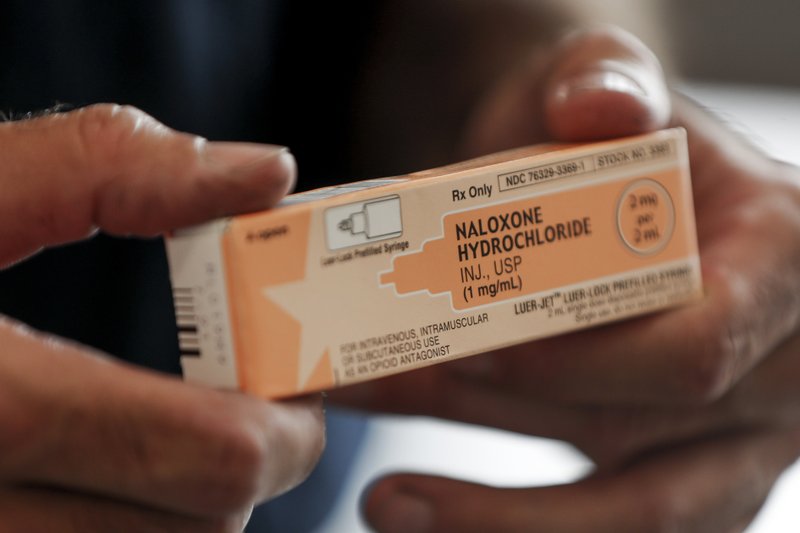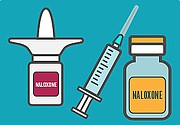ROGERS -- The Fire Department plans to train more first-responders on what to do when someone overdoses on opioids.
The Arkansas Department of Health recently awarded the department $9,000, which will mostly pay overtime to staff members who will train outside agencies. This is the first time the department has received the grant, Fire Chief Tom Jenkins said.
Signs of an overdose may include:
• Small, constricted “pinpoint pupils”
• Falling asleep or loss of consciousness
• Slow, shallow breathing
• Choking or gurgling sounds
• Limp body
• Pale, blue or cold skin
Source: U.S. Centers for Disease Control and Prevention
The idea is for larger agencies, such as the Rogers Fire Department, to train rural and volunteer departments that don't have as much money and resources about how to administer Narcan.
Narcan is a drug commonly known as naloxone that can stop an overdose in an emergency situation, said Joe Martin, substance misuse section chief at the Department of Health. The grant will pay for Narcan for the agencies going through the training, he said.
"Naloxone is not a replacement for emergency medical care for an overdose. Even if the patient wakes up or improves, you should still seek emergency medical assistance," according to the National Alliance on Mental Illness.
The Health Department received about $44,000 in federal grant money from the Substance Abuse and Mental Health Services Administration to distribute to cities, counties or ambulance services. The Health Department has received 10 applicants including Rogers, Martin said. No other cities or counties in Northwest Arkansas have been awarded the grant.
"Having those responders trained means that we can save a life," Jenkins said. "Narcan is something that does miraculous things to people that have experienced an opioid overdose."
The Rogers Fire Department has two full-time captains who administer its emergency medical program. Rogers has trained its personnel at the expense of the city, he said.
Rogers firefighters and police officers are trained how to administer the drug, Jenkins said. Rogers operates its own ambulance service and will likely focus on training in areas where its ambulances serve, such as Little Flock. All Rogers ambulances have Narcan on board.
Little Flock's 17 volunteer firefighters aren't trained nor do they carry Narcan, Fire Chief Josh Dunavan said.
Dunavan said even though the department doesn't typically see drug overdoses, the training would be beneficial because the firefighters are likely to encounter drug overdoses in the future because they are on the rise.
Drug overdose deaths continue to increase in the United States, according to the federal Centers for Disease Control and Prevention's website. More than 702,000 people died from drug overdoses between 1999 and 2017. Drug overdoses became the leading cause of injury-related death in the United States in 2017 with more than 70,000 deaths. Of those deaths, almost 68% involved a prescription or illicit opioid, according to the centers.
"It's been called an epidemic, and, while I don't know that it's at epidemic proportions here in Northwest Arkansas, it certainly has the capacity to be. It's a real threat, " Jenkins said.
Jenkins said his personnel regularly see opioid overdoses.
About one-half of Arkansas' 75 counties, including Benton County, had an average of 10-15 drug overdose deaths per 100,000 people from 2010 to 2018, according to the Health Department.
Nineteen counties, including Washington County, had fewer than 10 overdose deaths per 100,000 people, while another 17 counties had more than 15 overdose deaths per 100,000 people, according to the Health Department.
The drug overdose death rate in Arkansas was 15.1 deaths per 100,000 people in 2018, according to the Health Department.
The Health Department encourages doctors who prescribe high dosages of opioids to also prescribe naloxone because of the overdose risk, Martin said.
People without a prescription for naloxone may request the drug at pharmacies because of a standing prescription from Dr. Nathaniel Smith, secretary of health for Arkansas.
A Narcan kit, which includes two doses of the drug, generally costs between $120-150 without insurance, Martin said.
Arkansas BlueCross BlueShield and Medicaid cover naloxone, spokeswomen for the agencies said.
Naloxone is not harmful if administered to someone who is not experiencing an overdose, Martin said.
NW News on 02/18/2020


